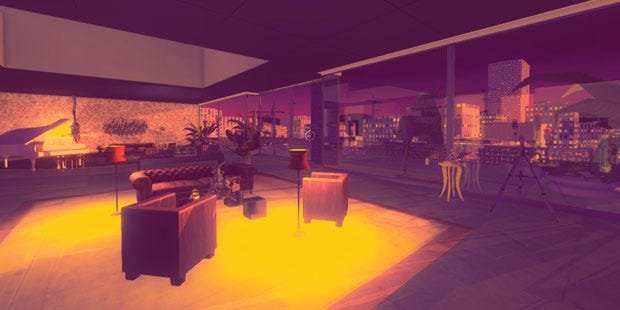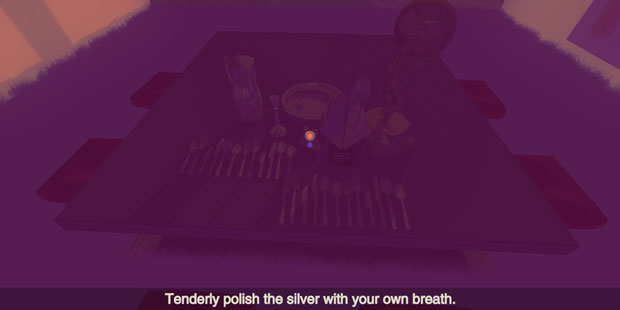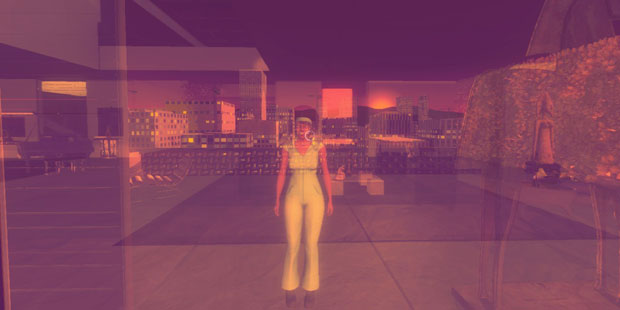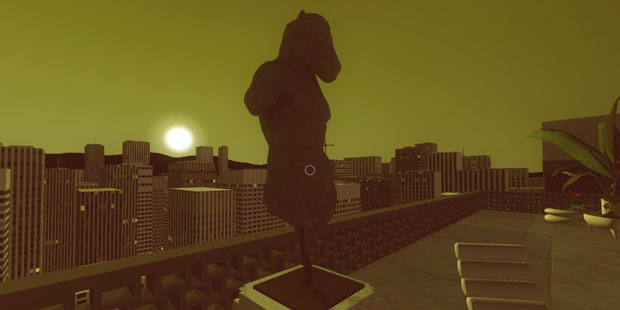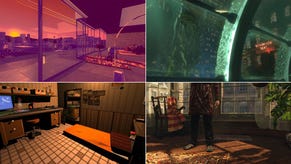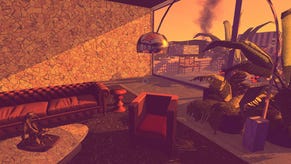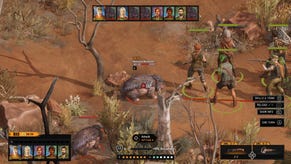Wot I Think: Sunset
House and home
I like Sunset [official site] for its sense of place, for its lighting, for its drip feed of story, for the emphasis on subtle change and human scale in an event games tend to deal with via guns and power fantasies and super tech. But when it comes to the relationship building which lies at the centre of the game Sunset can stumble. Here's Wot I Think.
You play the game as Angela Burnes, an engineering graduate from the US working as a housekeeper for a man called Gabriel Ortega in the fictional Latin American city of San Bavon. It's 1972 and there has been a military coup. Angela is politically engaged and it's through her thoughts and diaries you find out more about the situation in the country and the actions of a resistance movement.
The story unfurls gradually, more with each visit to Ortega's apartment. You find out more about Angela and Ortega's involvement with the political situation as well as how that develops or changes as the conflict continues. It's also through these visits – taking place the hour before sunset every few days – that you navigate your relationship with the off-screen Ortega.
Each visit he'll give you a to-do list and what you do and how you do it can affect that relationship. For example, he tasks you with painting an area of the house and your options are for a warm, welcoming red or a cool blue. When watering plants you might choose to do the bare minimum or you might also tidy the dead leaves which have fallen. Mending a shirt you can use a heart-shaped patch or just the same coloured thread as the shirt. You make your choice by clicking either the red option (those are the flirty ones) or the blue (those are more neutral or combative) when you hover over the activity. You can also find extra activities or chances to interact as you move around the apartment – boxes to unpack, a telescope to look through, a piano to prod at, a chess set to play with.
In my original playthrough I went for a mixture of options depending on mine or Angela's mood and the result was a warm relationship between Angela and Ortega. Playful notes appeared around the house on artworks during some visits while concern was expressed when Angela was going through a tough period. It became an interesting thing and a rich one, but it started off feeling slightly odd. The game seems to have you be attached to Ortega from near the start and it feels disproportionate at times – where is this affection or concern supposed to have sprung from at this early point in the relationship where all you know is his house? It then runs counter to the frustration Angela also expresses early on, particularly with some of the luxuries afforded to Ortega by his position and her own irritation that, despite leaving the US and its attitudes towards black women, she has still become some affluent dude's housekeeper. These frustrations felt genuine for the character and they butted up against the affection weirdly for me in the early game.
It settled down as I got further into that original playthrough and the initial oddness gave way to a pleasurable dynamic. However, the game does seem to push you towards the more flirty choices. If you think Angela is irritated by, or at least wary of, Ortega then the game using adjectives like boring and plain in the description of the blue option makes choosing those options less palateable. It feels like she gets to express something of herself in the red options while the blues are more blank. I get that this might be to push a sense of business-like efficiency but it's not quite in keeping with how the game plays, nor her growing attachment to the apartment. I would have liked them to feel as expressive of her and her intelligence and playfulness, just with a different tone.
It can also just be flat-out mechanically difficult to select the blue options when it's a choice involving a single object. When that happens the red option is just above the blue one. The arrangement of the buttons and the early game implementation trains you to mouse up for red and down for blue but some options involve moving from side to side, or when you mouse down it doesn't trigger the blue and you have to approach the object several times, adjusting the angle before you can find it. I ended up needing to switch over to the keyboard buttons for some of those options.
I tried an entirely blue playthrough later to see how much that affected the experience and noticed a feeling of being in conflict with the game in order to keep that blueness going. Angela also continued to voice concerns or affection for Ortega. It wasn't always jarring because the story itself remains the same and so some of it was reactions to story beats but sometimes it was disproportionate. In a game which states there is no wrong choice, blue certainly kept feeling like Sunset's less preferred option.
Actually, the choice system has echoes of Mass Effect's paragon/renegade setup in that subtlety can be notable in its absence. I AM PUTTING A FURRY AND SENSUAL BED COVER ON YOUR BED versus HERE IS YOUR FUNCTIONAL, MODERN BEDSPREAD OF COLDNESS.
That's the explicit relationship; the one with Ortega. There are two others which I thought were incredibly strong. One was Angela's with her brother. It was an affecting part of the story and I think that's a lot to do with it unfolding gradually through Angela's monologues, meaning it isn't caught up in the complexities of gamer choice and reaction. It's Tale of Tales telling a story as you go about your housekeeping.
The other relationship is Angela's emotional connection to the house. At first it's just this empty thing where you can unpack expensive-looking but impersonal furniture and artworks. Through time and repetition you get to know the house and its objects. You notice when there's a tiny change and you wonder why. You become attuned to the space and its pre-sunset glow. Tale of Tales manage to create a feeling of sort-of-sanctuary. Ortega's apartment is a place where I felt like Angela might find a degree of comfort and one where any violation of that space feels shocking. Building that sensation is no mean feat.
Sunset is a beautiful game which operates on a very human and emotional scale. The relationship building can be awkward (and at one point a reaction from Ortega actually seemed to arrive before the event which precipitated it). But, despite this, Sunset is a wonderfully atmospheric slow burner and a valuable addition to a medium where the predominant approach to conflict is to just give you a big old gun and invite you to get stuck in.
